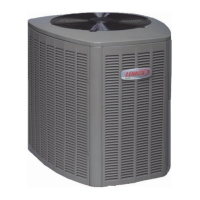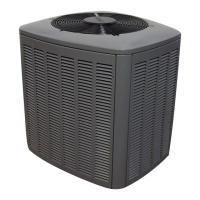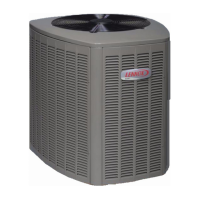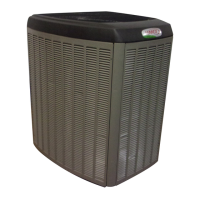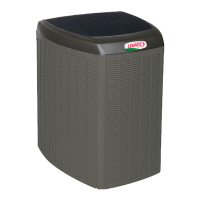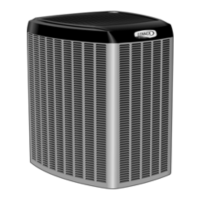Page 34
XP25
Table 6. Outdoor Control 7-Segment Display Alert Codes and Inverter LED Flash Codes
NOTE - System fault and lockout codes take precedence over system status codes (cooling, heating operating percentages or defrost/dehumidification).
Only the latest active fault or lockout codes are displayed (if present). If no fault or lockout codes are active, then system status codes are displayed. Alert
codes are also displayed on the iComfort Wi-Fi
®
thermostat.
Alert
Codes
Inverter
Code
Inverter LED Flash
Code (number of
flashes)
Priority Alarm Description Possible Causes and Clearing Alarm
Red LED Green LED
E 434 53 5 flashes 3 flashes
Moderate /
Critical
Outdoor control has lost
communications with the
inverter for greater than 3
minutes. Outdoor control
will stop all compressor de
mands, recycle power to
the inverter by de-energiz
ing the contactor for 2
minutes. If this occurs 3
time in one thermostat call,
the outdoor unit will locked
out and display a critical
code.
Issues:
(1) Loose electrical connections.
(2) Interruption of main power to inverter.
Corrective Actions:
(1) Check all electrical connections.
(2) Check for proper main power to inverter.
E 435 60 6 flashes OFF
Moderate /
Critical
Inverter internal error.
When this error occurs, the outdoor control cycles
power to the inverter by opening the contactor for two
minutes. Check that the EEPROM is properly seated.
After power is cycled to the inverter 3 times, the out
door unit is locked out
.
E 436 62 6 flashes 2 flashes
Moderate /
Critical
Inverter heat sink temperat
ure exceeded limit. Occurs
when the heat sink temper
ature exceeds the inverter
limit. Inverter issues code
13 first, then slows down to
allow the heat sink to cool. If
temperature remains high,
outdoor unit stops (com
pressor and fan). Anti-short
cycle is initiated. If condition
occurs 5 times within an
hour, system is locked out.
To clear, disconnect power
to outdoor unit and restart.
Issue: Feedback from supplier tear down of inverter in
dicates that the screws that hold the inverter to the invert
er board were loose causing poor contact between these
two components.
Corrective Action: Tighten screws that hold the heat
sink to the inverter control board.
NOTE: Wait five minutes to all capacitor to discharge be
fore checking screws.
E 437 65 6 flashes 5 flashes
Moderate /
Critical
Heat sink temperature
sensor fault has occurred
(temperature less than 4ºF
or greater than 264ºF after
10 minutes of operation)
.
Occurs when the temperature sensor detects a temperat
ure less than 0.4ºF or greater than 264ºF after 10 minutes
of operation. If condition is detected, outdoor unit will stop
(compressor and fan). Antishort cycle is initiated. If con
dition occurs 5 times within an hour, system will lock out.
To clear disconnect power to outdoor unit and restart. If
problem persists, replace inverter.
E 438 73 7 flashes 3 flashes
Moderate /
Critical
The inverter has detected a
PFC over current condi
tion. This would be caused
by a high load condition,
high pressure, or outdoor
fan failure.Outdoor control
will display the code when
the inverter has the error.
After 3 minutes, the inverter
will reset and the com
pressor will turn on again.
If it happens 10 times with
in a 60 minute rolling time
period, the OD control will
lock out operation of the
outdoor unit and display a
critical code.
Issue: Possible issue is system running at high pres
sures. Check for high pressure trips or other alert codes in
room thermostat and outdoor control.
E 439 12 1 flash 2 flashes Moderate
Compressor slowdown due
to high input current.
Input current is approaching a high limit. Compressor
speed automatically slows. The control continues send
ing the inverter speed demanded by the thermostat. The
control sets indoor CFM and outdoor RPM to values ac
cording to demand percentage rather than the actual Hz.
Alarm is automatically cleared.
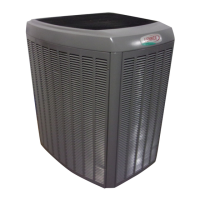
